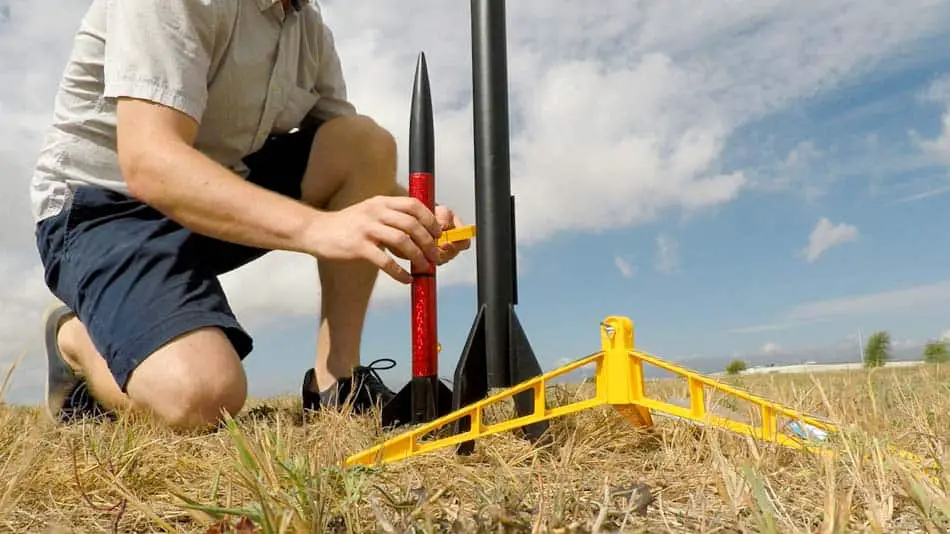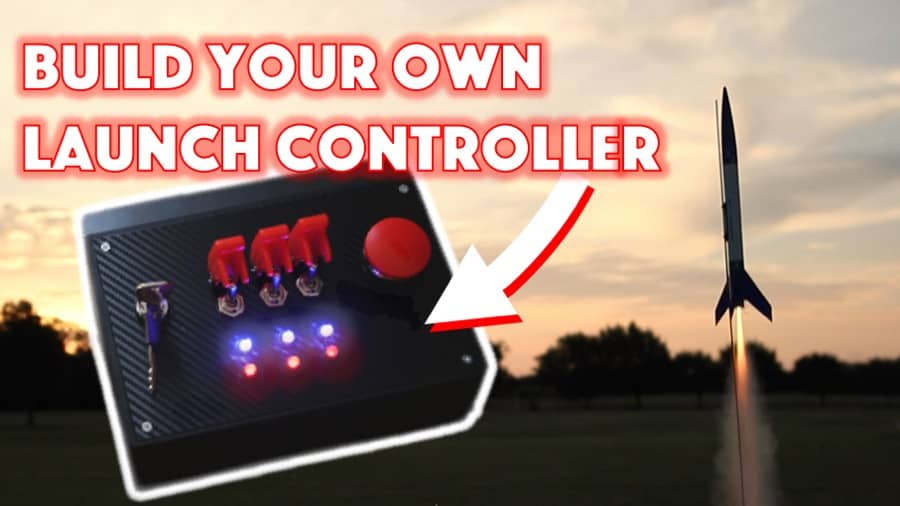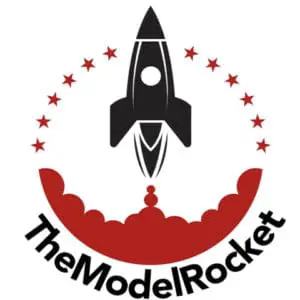
As you become more interested in model rocketry, you will inevitably begin to wonder if you can create your own rocket engines, especially as you start buying those expensive high powered engines. It is only natural to wonder. You’ve built the rocket yourself, after all. Building the engine is the next logical step in developing your skills.
But is it legal to make rocket fuel? Yes. Making model rocket fuel and engines is legal in the United States according to Federal law, but your specific state and local laws may differ. Some of the materials you may want to use to build an engine may require a permit from the Bureau of Alcohol, Tobacco, Firearms, and Explosives.
While building your own rocket engine is legal in the United States according to Federal law, that doesn’t mean that it is safe. In fact, it is not safe at all, and it shouldn’t be tackled without a lot of knowledge nor without taking the necessary safety precautions.
Continue reading for more information about regulations concerning the making of model rocket engines, and a brief overview of the kinds of engines you may be interested in concocting.
This post is based solely on our own research and findings. Ultimately both compliance with local and federal laws as well as your own safety is your own responsibility.
Have you considered building your own model rocket launch controller?
We just built our own beautiful launch controllers that make launches SO much more fun, and we documented EVERY single step and item purchased and put it into a step-by-step course that teaches you how to do the exact same thing.
Click here to learn more about how you can build your own launch controllers!

Regulations Concerning Homemade Rocket Engines
Many of the regulations placed on explosive materials or products by the Bureau of Alcohol, Tobacco, Firearms and Explosives do not apply to model rocket engines. This exemption is in Title 16, Chapter 2, Subchapter C, Part 1500, 1500.85(a)(8) of the Federal Code.
While it is perfectly legal to make model rocket engines for your personal use, in order to sell model rocket engines, you would need a get the engines certified and you would also need a special AFT permit.
Additionally, the model rocket industry sets higher standards for itself than the federal government does. Many states use the regulations created by the National Fire Protection Association (NFPA) and the National Association of Rocketry (NAR) to create their own regulations.
Check with your local law authorities to ensure that you are not breaking the law by making your own model rocket engines.
The NFPA prohibits the use of homemade rocket engines when launching model rockets or high powered model rockets. They insist that all engines must be certified. The NAR also prohibits using any rocket engine that is not certified.
The Tripoli Rocket Associating (TRA) has a different stance on model rocket engine experimentation. The TRA allows for its members to participate in research launches under certain circumstances.
TRA sponsored research launches are specially created for experimental rocketry including the testing of homemade rockets and rocket engines. This is an ideal way to test a model rocket engine as extra safety precautions are taken.
One organization is even more friendly towards those wishing to build experimental engines and rockets, and that is the Friends of Amateur Rocketry, Inc. They have a launch site dedicated to experimental rocketry. They also offer safety information, classes, and competitions for experimental rocketry.
Their launch site is located in California just outside of the Mojave Desert. If you aren’t on the West coast, this might be a stretch for you, but the competitive events look amazing. Well worth traveling to.
Homemade Model Rocket Engines and Safety
NASA warns: “Don’t brew your own fuel. This is extremely dangerous, and students are killed and maimed every year attempting to mix their own fuels. Don’t attempt to modify the nozzle or the casing of the solid rocket engine.”
And if NASA says it, it must be true right? I mean, they know rockets. Granted they are speaking to a younger crowd, but plenty of grownups could use the same warning.
It is for good reason that many of the regulations concerning model rocketry discourage people from making their own engines. Safety is the main purpose of these organizations and making your own model rocket engines is not a safe activity.
There is no safe way to create an explosive engine. Even done in the safest possible way, there is always some risk. Many rocketry enthusiasts are lulled into a false sense of security by the simplicity of the instructions for making model rocket fuel, but simple does not mean safe.
In this section, I will share some safety reminders and precautions you should consider when making rocket fuel.
You should always seek out a mentor when you want to make your model rocket engines. Tutorials on the internet are no replacement for real experience. Poorly done tutorial videos or websites can give poor instructions or have such poor directions that you make an error.
If you are not thoroughly educated on the topic of building model rocket engines or working with a highly experienced mentor, then you should not try to make a engine. It is that simple. Find someone who knows what they’re doing and learn from them.
You can find a mentor by joining a local rocketry club or joining the TRA, which has a mentorship program. Go to launch events, meet people, find out who makes their own engines, and see if they’d be willing to help you learn.
Always respect the materials and be aware of the dangers. Take making model rocket engines seriously. You’re making rocket fuel, remember. This stuff can launch your rocket thousands of feet into the air. The potential for life threatening explosions is real when you’re making your own engines.
The materials used to construct model rocket engines are often dangerous in and of themselves. They are often poisonous if ingested, and many materials should not be handled without proper gear. Once again, respect the ingredient, understand the danger, and keep this stuff away from children.
Safety Precautions
These are a few safety precautions you can take to help you stay safe while making model rocket fuel.
- Wear safety goggles.
- Wear heat resistant gloves.
- Keep the materials you are not using away from the workspace, especially flammable materials.
- Follow instructions carefully.
- Take exact measurements.
- When you finish an engine, put it away where it would not ignite in the event of a fire.
- If you test your engine, make sure you are in a large open space and that you are far away when it begins to go off.
Types of Homemade Model Rocket Engines
Just about any kind of model rocket engine you find on the shelf at your local hobby shop can be made at home. Below I will share a brief description of each of the different kinds of model rocket engines you might be interested in building.
Rocket Candy
Rocket candy, also called R-Candy, is a homemade rocket fuel made out of sugar and other easily acquired items. Rocket candy is typically made using powdered sugar or sorbitol and potassium nitrate which is frequently found in stump remover.
Making rocket candy is legal by federal laws and obtaining the materials to make it is easy, but it is not allowed in most competitions or in any events hosted by the NAR or TRA, unless that event specifically allows for experimental engines.
Calling an experimental rocket engine rocket “candy” may make it sound cute and safe, but there is always the potential for injury or worse when making a model rocket engine.
Rocket candy is inexpensive to make and requires no special permit to purchase the items needed to construct the engine. To make an engine using rocket candy, you would need powdered sugar, stump remover, kitty litter, PVC piping, and a few specialty tools.
For an inside look at what it takes, you should check out this tutorial video. It goes over the steps to make a simple rocket candy engine without heating any of the materials.
Again, your safety is YOUR responsibility. We do not advocate for the experimental production of rocket fuel. Do so at your own sole risk.
Different people advocate for different methods of making rocket candy. Some model rocket engine makers use granulated sugar and corn syrup mixed with potassium nitrate, but others prefer to use ammonium or potassium perchlorate instead of potassium nitrate.
In short, you will find a number of different rocket candy recipes out there, some better than others. Only experience can help you learn how to handle each combination or how to come up with a new combination of your own.
Black Powder Rocket Engines
Black powder is just another name for gunpowder. It is made from charcoal, sulfur, and potassium nitrate. Many of the commercially made rocket engines are black powder rocket engines.
Making black powder model rocket engines is a fairly simple process, especially when compared to the homebrew method of rocket candy.
But, once again, simple does not mean safe. Black powder is a very touchy substance. It ignites very easily, which makes it perfect for using in model rocket engines but working with it and storing it can be challenging. Many people store black powder outside of their homes or in a fireproof cabinet.
Many people prefer making rocket candy because most of the items required are easily found around the home or with a short trip to the store. Making a rocket engines with black power requires rocket tooling. Rocket tooling consists of a spindle and rammers used to make the black powder compact.
Ammonium Perchlorate Composite Propellant (APCP)
APCP is a solid rocket propellant that is cast into a shape instead of compacted by pounding with a mallet as is the case with rocket candy and black powder rocket engines. This results in a very consistent engine.
APCP is typically used to make higher powered model rocket engines. These engines generally contain ammonium perchlorate, aluminum, and some sort of binder.
Just like the other engines the APCP engines not very difficult to make, but they also aren’t very difficult to mess up or do unsafely. I repeat: simple does not mean safe.
What about Zinc-Sulfur Model Rocket Engines?
Zinc-sulfur used to be very commonly used to create homemade model rocket engines, but it has since become obsolete. This is primarily because it is a very touchy substances that burns easily and fast and is very sensitive to static.
For every story you hear about someone who messed around with zinc-sulfur without any trouble, you hear another from someone who was seriously injured.
Even the TRA will not allow member to launch rockets with zinc-sulfur engines as it is seen as an unnecessary risk with the advent of APCP.
To view a model high powered model rocket being launched with a zinc-sulfur engine, check out this video of a launch at the Friends of Amateur Rocketry launch site.
The Takeaway
While making model rocket fuel is legal in the United States according to Federal law, it may not be legal according to state or local laws, and it is prohibited or discouraged by many national rocketry associations because it is exceedingly dangerous.
Do not be fooled by the simplicity of making model rocket fuel. It is easy, but it is still a dangerous activity. Your safety is your responsibility.
Build Your Own Launch Controller
Don’t forget! You can ditch the stock controllers and confidently build your own from scratch using our step-by-step instructions and exact materials list! We promise this will make your launch experience 10x better, and using our course License to Launch you can be 100% confident you’ll be able to finish this project and be super proud of what you’ve built! Here’s a sneak peek below.
